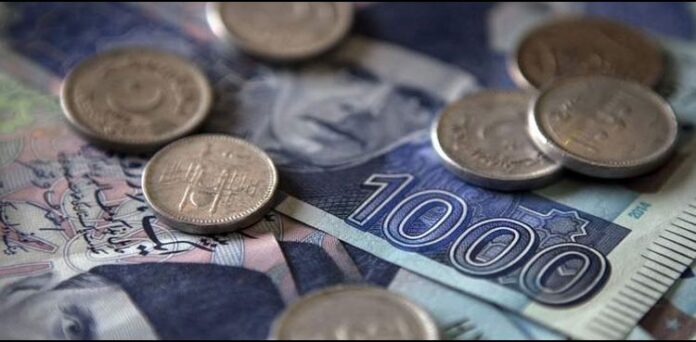–Expenditures clock in at Rs6.3tr against revenues of Rs4.6tr
–Govt spent Rs1.8tr on debt servicing, Rs802bn on defence, Rs31.8bn on education and Rs5.1bn on health
ISLAMABAD: Pakistan’s budget deficit during the first nine months (July-March) of the current fiscal year (FY20) was recorded at Rs1,686 billion (3.8pc of the GDP), according to the Federal Fiscal Operation Summary 2019-20, released by the Ministry of Finance on Wednesday.
According to the report, during the July-March FY19 period, the country’s expenditures clocked in at Rs6,376bn as compared to the revenues of Rs4,689bn.
In order to cover the Rs1.68tr deficit, the government had managed Rs682bn from external and Rs1,003bn from domestic sources.
Of the total 6.37tr expenditures (14.5pc of the GDP), the government spent Rs1,879bn on domestic and foreign debt servicing, while Rs802bn was spent on the defence budget. The government had allocated Rs1.152tr for defence for the current fiscal year.
According to the report, the federal government spent Rs340.4bn on developments projects during the period under review, whereas provincial governments spent Rs382bn for the same.
Similarly, the government spent Rs218.9bn on pension payments, Rs72.01bn on public order and safety affairs, Rs31.8bn on education, Rs5.1bn on health and Rs4.3bn on recreation, culture and religion.
Of the total revenues of Rs4,689bn, the government collected around Rs1,033bn as non-tax revenues. Within these non-tax revenues, the government collected Rs70.03bn as markup on public sector entities, Rs26.05bn as dividends, Rs635.5bn as profits of State Bank of Pakistan, Rs113.1bn as profits of Pakistan Telecommunication Authority (PTA), Rs10.8bn from defence services, Rs16.3bn as passport fee, Rs10.5bn from discount on crude oil, Rs65.5bn as royalties on gas and oil, Rs4.6bn as windfall levy against crude oil and Rs60.1bn through other sources.
The Federal Board of Revenue (FBR) collected Rs3,044bn during the period under review, of which Rs1,146bn were direct and Rs1,898bn were indirect taxes.
Talking to Pakistan Today, former finance secretary Dr Waqar Masood said that the actual projection would come in the last quarter as the government is giving cash to deserving people. “In addition to this, government expenses are increasing sharply. Currently, the deficit is 3.8pc and this can be close to 10pc of the GDP during this year,” he said.
He said that the State bank of Pakistan (SBP) also decreased the interest rate due to which the income will further plunge. “The government is collecting taxes from petroleum products and the FBR can get an extra Rs100bn to Rs150bn by increasing the petroleum development levy in the last quarter but they cannot overcome the Rs1,500bn difference between the actual target and revised Rs3,908bn target,” he added.
Economist Muzammil Aslam told Pakistan Today that the budget deficit would go to 9pc to 10pc of the GDP due to the ongoing pandemic.
He was of the view that the government maintained the fiscal discipline from July to March. The government has an estimated deficit of 7.1pc of the GDP and it recorded 3.8pc in nine months, he added.
“The government’s expenses surely increased in the last quarter as it started different programmes to help deserving people. It will spend an additional Rs500bn in the last quarter due to which the deficit would be around 9pc to 10pc of the GDP,” he said.
Aslam further said that the government, in its report submitted to the International Monetary Fund (IMF) during the second review, projected the deficit around 6.8pc of the GDP due to decrease in tax revenue. “The FBR should be able to collect Rs4,200bn against the revised target of Rs3,908bn during this year,” he added.




